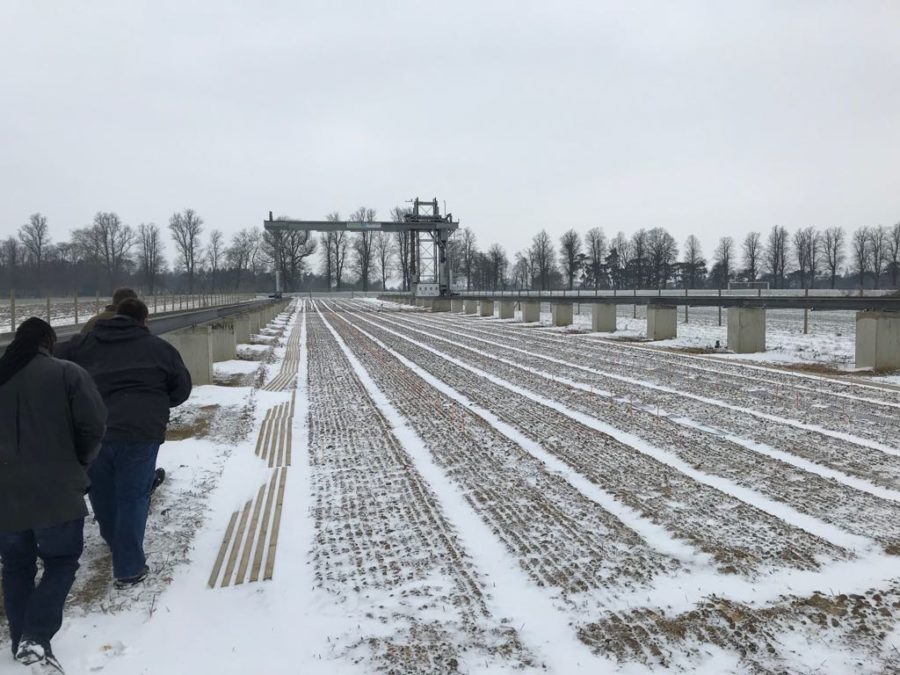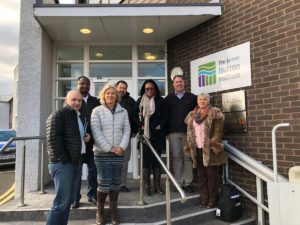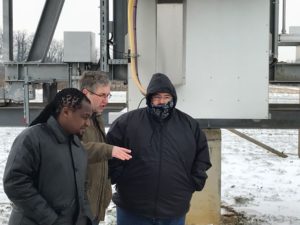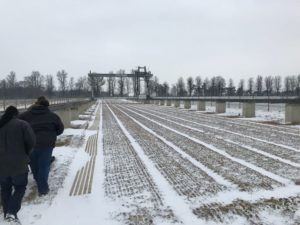29th March 2018 Science and Innovation Network
South African Wheat Scientists tame the ‘Beast from the East’ in the UK

Late in February to early March [26 Feb-2 Mar], I led a group of five (5) South African small grain researchers and enthusiasts on a UK Agritech inward visit. With the support of the UK Science and Innovation Network (https://www.gov.uk/world/organisations/uk-science-and-innovation-network) in South Africa, the group set out learn more about the UK research offer in specifically wheat and barley research and innovation. The mission was clear- to learn through potential partnerships with the UK how to improve the quality of wheat yield from a genomic level, without compromising the quality. Having left in the middle of summer in South Africa we were welcomed by snow-capped mountains –which was a glorious sight to behold as we descended to Edinburgh to finally make our first stop in Invergowrie.
Day 1: The delegation started the journey in Scotland, Dundee. Welcomed by Prof. Robbie Waugh at the James Hutton Institute- which strives to be at the forefront of innovative science that sustains the management of land, crops and natural resources which in turn support thriving communities. Central to the discussions on the day were the intricacies of barley genetics and malting, the International Barley Hub and bio-informatics visualisation software. Barley is the world’s fourth most cultivated cereal, and with Scotland being the world leader in whiskey exports to the value of £45bn/year, the International Barley hub ( http://www.barleyhub.org/ ) aims to create the world’s leading centre of excellence in barley science supporting the supply chain through industry focussed research , innovation knowledge exchange. This being an initiative that is at its developmental stage (virtual and open to international collaboration) in the efforts to provide a global research platform that increases the translation and application of this research around the globe, it was an opportune time to build foundations for future partnerships around the world.
Bioinformatics is a central tool to the genetic understanding of the mechanisms of crop breeding. JHI has a wide offering in pathogen diagnostics, genome assembly and annotation, mobile app development and protein engineering (https://ics.hutton.ac.uk/). The first day of the trip was a tremendous was and set the tone of what would be high standard of engagements that the delegation would come to expect and experience throughout the whole week.

From L-R: Prof. Robbie Waugh-Programme (Leader-Cell and Molecular Science- James Hutton Institute); Dr Toi Tsilo (Senior Manager- Agricultural Research Council -Small Grain Institute); Dr Renee Prins (Director CenGen (Pty) Ltd) ; Dr Willem Botes (DST/Grain SA Wheat Breeding Platform-Department of Genetics, University of Stellenbosch); Dr Xolelwa Zulu (Science and Innovation Attaché-British High Commission-Pretoria) ; Dr Francois Koekemoer (Director R&D-Sensako); Ms Mariana Purnell ( General Manager, Agbiz Grain, SA Agribusiness Chamber)
The group then headed back to London on that cold Monday afternoon, nonchalant about the weather reports of the impending ‘Beast from the East’ and the implications thereof on the severity of the weather conditions. Someone should have paid more attention! Despite the weather and breathing in snowflakes –
Day 2 saw the group making way to the east of London – Norwich at the John Innes Centre. The Head of Department: Crop genetics, Prof James Brown facilitated engaging discussion on specifically improved yield, plant physiology and disease control in wheat and barley. The group also connected virtually to the Centre for Crop Protection and Health in Sand Hutton near York.
Day 3: Noticeably a string of luck followed the group as the worst of the Beast from the East seemed to get our tail end as we survived the height of its brutality, which saw the group heading to the west of London, in Bristol. The institutions visited were due to experience the worst the following day after we had been there! At the University of Bristol, we were hosted by Prof. Keith Edwards and his team that works on cereal functional genomics. With three focal strands i.e. SNP discovery, genotyping, data dissemination /integration – collaborations and partnerships were central to all the discussions and highlighted the importance of the visit towards building mutually beneficial alliances.
Day 4: Only on the fourth day, did we get to experience the full might of the Beast from the East as plans to travel to Cranfield University to the AgriEpiCentre (Agricultural Engineering Precision Innovation Centre-https://www.agri-epicentre.com/) were stalled due to cancelation of railway transport.
Day 5: On the final day, against all the weather odds we made our way to Rothamsted Research, Harpenden. Rothamsted is a world leading research centre with a rich history of ground-breaking discoveries in agricultural science. The cumulative impact of the centres work exceeds £3bn/year (Rothamsted Research and the Value of Excellence. Séan Rickard, 2015). The core values of the centre include working collaboratively (harnessing and acknowledging the contribution of others), pursuit of excellence, embracing innovation and change, acting with integrity. Two areas of common interest between these groups were Wheat Yield (Bio-interactions and Crop Protection) and Molecular Plant Physiology led by Sigrid Heuer outlining plans to have a breeder’s toolkit with at least 96 genotypes which will be tested across the UK. This platform can be accessed by scientists all over the world, South Africa included with Materials Transfer Agreements.
Rothamsted is the home to the WORLD’s first Field Scanalyzer – a fully automated, high throughput field phenotyping platform which measures crop growth within 10mx110m area with high resolution and reproducibility. The scanalyzer is robust enough to withstand harsh environmental conditions, with high sampling frequency and green house accuracy and provides information concerning the varietal responses to the extrinsic environment and their effect on yield. https://www.rothamsted.ac.uk/field-scanalyzer


The South African Team braving the cold to be within reach of the Field Scanalyzer
The visit was incredibly successful, with new connections made in different institutes in the UK, definite areas, linked to the private sector to follow-up on. What had been apparent in the 5-day journey is the strength of international partnerships in the UK research landscape. The trip was fascinating and as SIN there were a few obvious and valuable takeaways. Firstly, there is incredible value in international collaborations. Strategic partnerships in critical areas of research catalyse much needed knowledge transfer and shorten the relative technology development lead-time. Secondly, strong links have been built between an array of stakeholders between the UK and South Africa and common interest have been shared and deliberated on. Thirdly and finally, knowledge exchange has facilitated new avenues of research and technology development programme design which will respond to some of the questions that had remained unanswered before embarking on this trip.
The UK Science Network in South Africa is in an incredibly privileged position to have been part of this visit and we look forward to strengthening partnerships between the UK and South Africa and solidifying the position of the UK in influence, in areas that are of importance to both the UK and SA. The impact of this visit has been forethought and through the Wheat Revitalisation Programme of South Africa, it will be realised. The UK Science and Innovation Network is best placed to support these endeavours